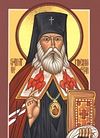

| Previous day | Next day |
| Old Style
February 3
|
Friday |
New Style
February 16
|
| Cheese-fare Week—no meat; fish and dairy allowed. Tone 3. | Cheese-fare Week—no meat.
|
![]() Afterfeast of the Meeting of Our Lord.
Afterfeast of the Meeting of Our Lord. ![]() Holy and Righteous Symeon the God-receiver and Anna the Prophetess (1st c.).
Holy and Righteous Symeon the God-receiver and Anna the Prophetess (1st c.). ![]() St. Nicholas, Equal-to-the-Apostles, enlightener of Japan (1912).
St. Nicholas, Equal-to-the-Apostles, enlightener of Japan (1912).
Prophet Azariah (10th c. в до Р.10th c..). Martyrs Papias, Diodorus, and Claudianus, at Perge in Pamphylia (250). Martyr Blaise of Caesarea in Cappadocia (3rd c.). Martyrs Adrian and Eubulus, at Caesarea in Cappadocia (ca. 308-309). St. Romanus, prince of Uglich (1285). St. Symeon, bishop of Polotsk and Tver (1289). St. Svyatoslav-Gabriel and his son St. Dimitry, of Yuriev (1253).
New Hieromartyrs Vladimir (Zagreba), hieromonk of Borisoglebsk Monastery (Novotorzhok), Basil Zalessky, archpriest, of Astrakhan, and Adrian Troitsky, archpriest, of Kazan (1938).
Martyr Paul the Syrian (284-305). St. Lawrence, archbishop of Canterbury (619). St. Werburga of Chester, abbess (ca. 700). St. Ansgar, bishop of Hamburg, enlightener of Denmark and Sweden (865). St. James, archbishop of Serbia (1292). St. Sabbas of Ioannina (15th c.). St. Ignatius of Mariupol in Crimea, metropolitan of Gothia and Kafa (1786). New Martyrs Stamatius and John, brothers, and Nicholas, their companion, at Spetses on Chios (1822).
Repose of Schemamonk Paul of Simonov Monastery (1825), disciple of St. Paisius (Velichkovsky), and Hieromonk Isidore of Gethsemane Skete, Moscow (1908).
Thoughts for Each Day of the Year
According to the Daily Church Readings from the Word of God
By St. Theophan the Recluse

Friday.
So will I save you, and ye shall be a blessing, promises the Lord through the prophet Zechariah (Zech. 8:7–23). But under what condition? Under the condition that every man will speak the truth to his neighbour, that men will righteously sort out their affairs amongst themselves, that men will not remember wrongs in their hearts against their neighbour, that they will love no false oath, and will love truth and peace. If these conditions are met, says the Lord, they shall be My people, and I will be their God, in truth and righteousness (Zech. 8:8), and His blessing shall spread among them. Then all strangers shall hear and say, “Let us go speedily to them to pray before the Lord, for we have heard that the Lord is with them (cf. Zech. 8:21–3). Yea, many people and strong nations shall come to seek the Lord of hosts (Zech. 8:22).
Thus did the high moral purity of the first Christians attract people and nations to the Lord. Those who live always according to the spirit of Christ are, without the use of words, the best preachers of Christ and the most convincing apostles of Christianity.
Articles
 Prophet AzariahThe name Azariah means “whom God helps.” The holy prophet lived during King Asa’s reign (2 Chron. 15:1). |
 Martyrs Papias, Diodorus, and Claudianus, at Perge in PamphyliaSaint Papias was martyred with Saint Claudianus at Perge, Pamphylia in 250. |
 Martyr Blaise of Caesarea, in CappadociaSaint Blaise of Caesarea lived in the third century. He was from Caesarea in Cappadocia (Asia Minor) and was a shepherd. |
 Martyr Adrian at Caesarea, CappadociaSaint Adrian of Baneas of Caesarea in Cappadocia. suffered martyrdom under Governor Firmilianus. |
 Martyr Eubulus at Caesarea, CappadociaSaint Eubulus, like Saint Adrian, was from Baneas, in Caesarea of Cappadocia. |
 St. Simeon the Bishop of Polotsk and TverSaint Simeon, Bishop of Tver was descended from the Polotsk princes. He was the seventh bishop of Polotsk and the first bishop of the Tver diocese. |







